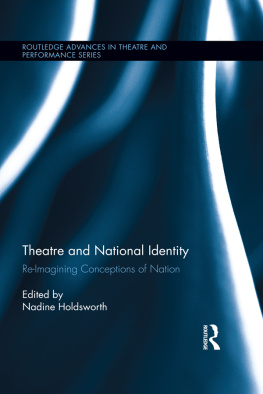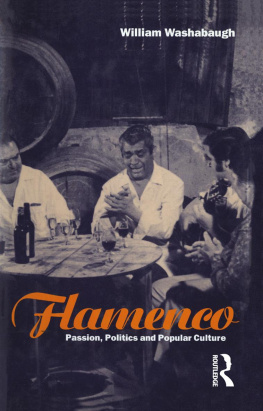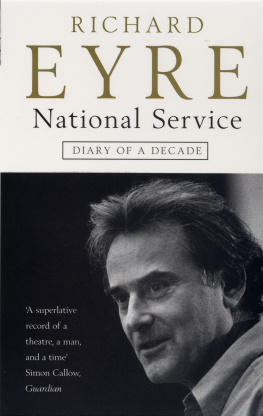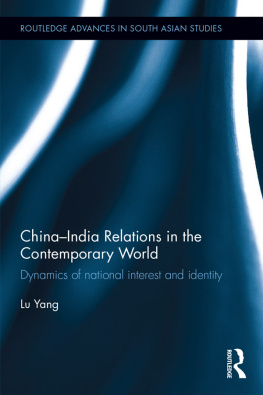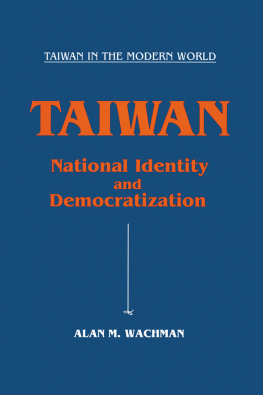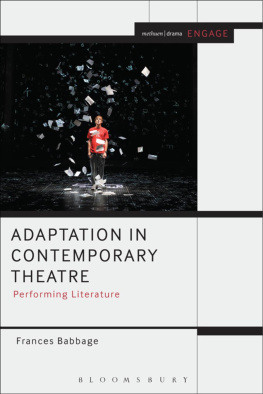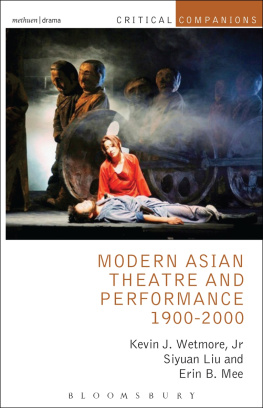1
Introduction
Nadine Holdsworth
Current preoccupations with questions of globalization, internationalism, transnationalism and cosmopolitanism can give the impression that the nation is receding in significance and that to draw attention to it is somehow politically nave or evidence of a retrograde parochialism. There is no doubt that we occupy an increasingly globalized world as is evident from organizations such as the United Nations, the International Monetary Fund and the G8; international trade and the flow of global capital; our heightened awareness of and influence by worldwide events facilitated by the flow of information from global media outlets; the interconnectivity of our cultural experiences as food outlets, television programs and films, music and artists have an international presence; and the scale of people crossing national borders as immigrants, tourists, refugees and itinerant workers reaches an unprecedented scale. Yet, contrary to Arjun Appadurais assertion that the nation is under supreme pressure by this phase of late modernity, I think we can still find compelling evidence to support Benedict Andersons view that the end of the era of nationalism, so long prophesied, is not remotely in sight. Indeed, nation-ness is the most universally legitimate value in the political life of our time. Or, as Homi K. Bhabha observes in relation to nation and nationalism:
Nor have such political ideas been definitively superseded by those new realities of internationalism, multi-nationalism, or even late capitalism, once we acknowledge that the rhetoric of these global terms is most often underwritten in that grim prose of power that each nation can wield within its own sphere of influence.
The title of this book, Theatre and National Identity: Re-Imagining Conceptions of Nation , is designed to incorporate several ideas that are central to the collection. This book is interested in the appeal and persistence of the nation and ideas of national identity as conceptual categories, but more significantly with how these shift and change given different national and historical circumstances. It is certainly not proposing that there is a homogenous catchall of nation that encompasses all nation
In his seminal collection Nation and Narration (1990), Bhabha enquires: If the ambivalent figure of the nation is a problem of its transitional history, its conceptual indeterminacy, its wavering between vocabularies, then what effect does this have on narratives and discourses that signify a sense of nationness. This collection is interested in the same question, but rather than literature, it turns its attention to the ways in which various recent theatrical outputs have engaged with the nation, often at moments of profound change and in recognition of theatres transitional history, through the sites it occupies, its interpretative approaches, its subject matter, aesthetic strategies and performance modes. It is concerned with the ways that theatre has participated in dynamic articulations of, challenges to and reappraisals of the nation and national identity in the late twentieth and early twenty-first centuries. As Helen Gilbert puts it,
Always a site of circulating representational forms, theatre becomes, at formative moments in the ongoing narrative of nationhood, a means by which communities register, reiterate and/or contest modes and models of national belonging.
Erin Hurley has cogently critiqued a simplistic equation between theatre, performance and the representation and/or construction of the nation, arguing that neither nation nor performance allows for transparent reference between the two terms such that one might perfectly stand in for the other. Indeed, it is a grandiose claim to suggest that theatre has the power to bring the nation into being literally or metaphorically, but it can and does frequently either directly or indirectly engage with questioning, re-assessing and challenging national politics, values and priorities. The theatre, taking place in a communal public arena, can be one of the ways that members of a nation contribute to public discourse, a national conversation, which opens up the possibility for reflection and debate. Explaining the rationale behind his inaugural production as Artistic Director of the National Theatre in London, Nicholas Hytner recalled:
The first show I produced when I became Director of the National Theatre in April 2003 was Shakespeares Henry V. When I scheduled it (in the summer of 2002) we had just fought a war in Afghanistan and it seemed likely that we would soon be fighting another in Iraq. It felt like exactly the play the National Theatre should be doing: it has often been a barometer of public opinion in times of war, and as it turned out the Iraq War started during rehearsals. It would have been perverse not to
According to Michael Billig, the activation of national identity works insidiously through assumptions about those participating in culture, as readers or spectators for instance, where the term we is unreflexively used as a signifier of us as members of the nation.
The wars in Afghanistan and Iraq have been deeply divisive in Britain as elsewhere. There are hugely divergent views about the advisability and legitimacy of those wars and the consequences of their aftermath for the domestic and international arenas. Hytner was not impervious to those differences, but viewed theatre as a space where some members of the nation, whether for, against or indifferent to the wars, could come to see how this 400-year-old play by Shakespeare could resonate with the contemporary moment. Equally, given the global implications of Britains decision to go to war, this national theatrical exploration had wide significance for an international audience too. In this case, the National Theatre was not acting as a stand-in for the nation proposed by Loren Kruger, but as a site through which the ideological maneuverings and actions of the nation state could be put under scrutiny. Indeed, this book situates theatre as politically engaged and active, a cultural form that is capable of provoking a complex interrogation of national histories, politics, icons and the affective power of national affi liation. It argues that theatre is part of an ongoing dialogue, a constant re-imagining of what the nation is, constitutes and means in any given moment.
As with any book, the thinking behind it draws on a long history of prior scholarship; in this case in previous studies of nation, national identity formations and the study of the relationships evident between theatre and nation. This book is not about National Theatres, but several excellent books that explore the histories, ideological workings and adaptability of National Theatres to changing times and political regimes pioneered by academics including Kruger and S. E. Wilmer have certainly influenced it. It has also been informed by many stimulating accounts of theatre in specific national contexts produced by Helen Gilbert, Jen Harvie, Jacqueline Lo and Joanne Tompkins, amongst others. It is particularly indebted to Hurleys work in National Performance: Representing Quebec from Expo 67 to Celine
This collection is concerned with the idea of national repertoires as both representational and deeply felt. Of course, there is a need to be wary of simplistically ascribing national character to theatre-making; theatre has always been a global art form bleeding across porous national borders. However, even though, as Hurley insists, it is important to move beyond reductive narratives that purport to aggregate theatre as uncomplicated reflections of the nation or the assumption that the theatres primary social value resides in its reflective capacities, As Bhabha implies there is always a slippage between reference to the nation and the multiplicity of the subjects that populate it.

